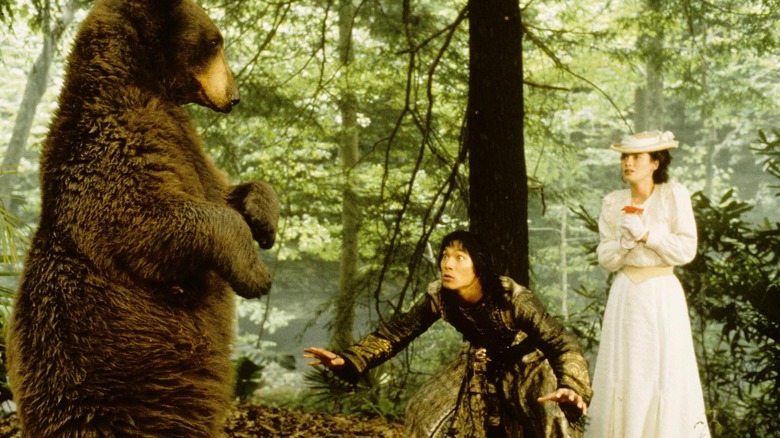The Live-Action Jungle Book Remake That Everyone Forgot About
Rudyard Kipling first published his novel "The Jungle Book" in 1894, and its sequel, "The Second Jungle Book," the following year. The books followed the adventures of a boy named Mowgli, a five-year-old who becomes lost in the jungles of India and who is taken in and raised by the local wildlife. He is taught the ways of the jungle, mostly by a benevolent panther named Bagheera. He also is given some more raucous advice from a bear named Baloo, and is taught to be wary of the vicious tiger, Shere Khan.
Most schoolchildren have read one or both of Kipling's "Jungle Book" novels, and it has been adapted to film multiple times. Director Zoltan Korda directed a rather fine 1946 Technicolor version, although more popular to today's audiences is the 1967 animated film directed by Wolfgang Reitherman. Walt Disney was credited as a producer, but he died shortly before "The Jungle Book" was released, making it one of the last films he worked on directly. The animated version is light and jazzy, and its songs by the Sherman Brothers have burned their way into the minds of anyone who has heard them.
Fun trivia: The song "I Wan'na Be Like You," performed by Louis Prima in Reitherman's film, was, of course, re-used in Jon Favreau's 2016 remake of "The Jungle Book." Favreau must like the song, because back in 1996, he also included it on the soundtrack to "Swingers," a film he wrote and starred in.
There was an additional adaptation of "The Jungle Book," however, that often goes overlooked by modern Disney scholars. Buena Vista Pictures (a former Disney imprint) distributed a live-action version of "The Jungle Book" way back in 1994. That version stars Jason Scott Lee as the adult Mowgli, and featured performances from Cary Elwes, Lena Heady, Sam Neill, and John Cleese. It was directed by Stephen Sommers, the B-movie mastermind behind "Deep Rising," "The Mummy," and "Van Helsing."
Remember the 1994 version of The Jungle Book?
The most notable creative wrinkle in Sommers' "The Jungle Book" is that the animals don't talk. Mowgli can communicate with them, but they don't have conversations in plain English like in the other above-mentioned adaptations. Indeed, the story emerges more as a riff on "Tarzan of the Apes" than "The Jungle Book," focusing a lot on the British colonialists and Mowgli's re-introduction to civilization. There is a subplot, as well, about the Elwes character looking for a lost city of gold, and his kidnapping and torturing of Mowgli to get information. The film is only rated PG, but it clearly aimed to be more "edgy" than the 1967 version that came before it.
The film was not a runaway hit, making $70 million on a $30 million budget after slipping into theaters during the 1994 Christmas season. That was a busy season that also included blockbusters and/or Oscar bait movies like "Nell," "Little Women," "Dumb and Dumber," "Disclosure," "Legends of the Fall," and, uh, "Street Fighter." Jason Scott Lee is very good as Mowgli, although he stands out more for his handsome face and glistening musculature than his performance. Because the animals don't talk, one might see Sommers' film as the secular version of "The Jungle Book," more concerned with adventures and wealth than the knowledge that humans can learn from the natural world. When compared to other live-action Disney films of the era, though, "The Jungle Book" certainly feels more mature and edgy. Sommers succeeded in that regard.
The film also received decent enough reviews; it currently has an 80% approval rating on Rotten Tomatoes, based on 45 reviews. Some critics pointed out that it hardly outdoes the 1967 version, leading to accusations of pointlessness.
"The Jungle Book" may also stand as the very first instance of Disney remaking one of its well-known animated films in live-action. The Glenn Close version of "101 Dalmations" came after this, and the trend was supercharged in 2010 with the release of Tim Burton's "Alice in Wonderland," but Sommers' "The Jungle Book" is the real precedent.

